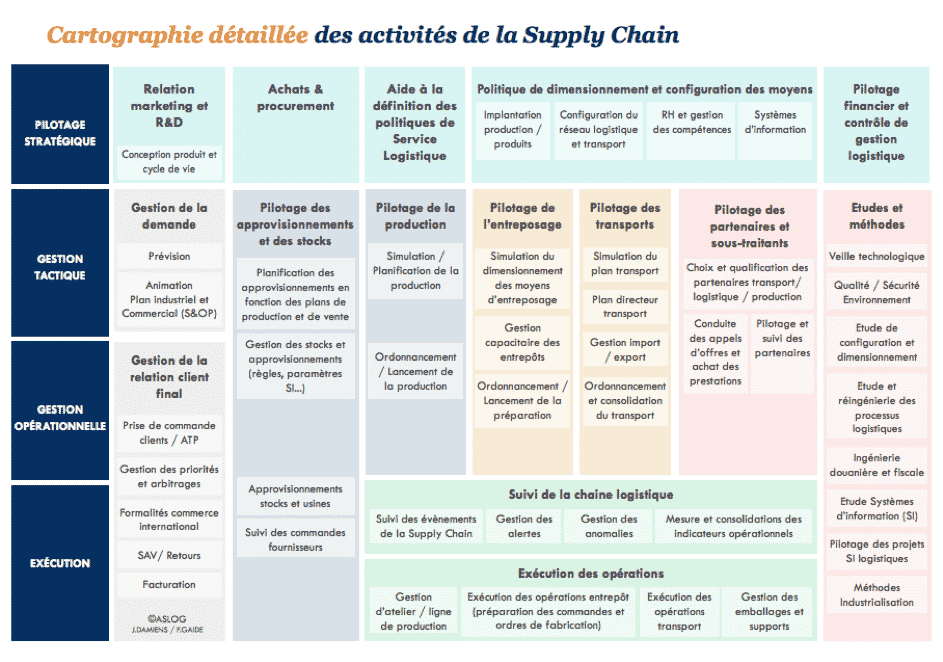
Even though the Supply Chain industry already employs 6% of the working population in France (1.9 million people to be more precise), this sector still remains little known and poorly understood by young people.
Too often reduced to transports or warehouses, the Supply Chain field is actually much broader. However, it takes a great deal of knowledge to be able to completely overview all the activities of this booming sector.
An interesting fact is that, while there are specialized training courses that prepare future employees for the different professions in the Supply Chain, one can also join this sector after a more general education in college and business or engineering schools.
So, the real question here is: how can we bring young people to look into these professions and the corresponding training ? How can we encourage vocations for professions that young students have never heard of even if they could be perfect for them? This is what is at stake in a changing sector full of great opportunities.
SUPPLY CHAIN, YOU SAID?
If you work in the Supply Chain industry, you are surely aware that the term Supply Chain is often unknown or misunderstood by others.
If you already have trouble explaining your job to those around you, imagine what an uninformed young person imagines when he/she hears this unusual term! Since this is a key sector in the French economy, it is absolutely necessary to promote it among young people and to make them understand about the career options and employment opportunities it has to offer.
AN UNKNOWN SECTOR THAT OFFERS MANY OPPORTUNITIES
The Supply Chain sector is full of opportunities. The emergence of e-commerce, modernisation processes and environmental challenges translate into a wide variety of activities as detailed in the chart below produced by ASLOG.

The environmental and societal challenges correspond all the more to the expectations of the new generations, who want to find meaning in their future profession.
Indeed, sustainable development is more than ever at the heart of the Supply Chain strategy, because in an increasingly complicated ecological context, one question remains: how can we rethink the Supply Chain industry considering all the societal and environmental responsibilities highlighted by consumers and investors?
New technologies are disrupting the Supply Chain field, which is seeing its operating model evolve from a reactive logic to a proactive one, sometimes even to predictive logic. Now more than ever, the use of artificial intelligence and the boost of human capacities are key to face all the industry challenges.
Now, it is time to focus on e-commerce: a new way of consuming that has a huge impact on the Supply Chain industry. How can we produce, store and deliver products that are no longer consumed in the same way they were ten years ago? This is a technological challenge among the Supply Chain, one that will last for generations.
YOU HAVE TO BE INVOLVED
The best way to twist a cliché is to give concrete information straight from the field. This can only happen with the help of people who really know what they are talking about and who are willing to share their experience. When we think about it, this can definitely help young people better understand the different jobs in this sector and maybe encourage them to join a Supply-Chain-related course or pursue a career in this industry.
If only more professionals in specialised sectors such as the Supply Chain industry – as well as in others – could be in touch with young people, we could reverse the trend. This could be a way for these professionals to highlight the greatness of their jobs as well as all the existing opportunities within the industry. But how can we get young people’s attention and make sure these meetings between them and professionals happen?
Companies have long-time promoted their employee branding for a long time and job offers on recruitment forums. Nevertheless, this approach often involves speaking exclusively with Human Resources experts: operational staff are usually nowhere to be seen. So, for a student that is potentially interested in the Supply Chain, what are the chances for him to meet the right person? The one who will talk to him and explain all the details of his job?
The relationship between young people and employers has always been essential and must be fluidified to allow each party to meet his expectations and goals. My Job Glasses was created 5 years ago as an answer to this need.
MY JOB GLASSES : EASILY SHARE YOUR EXPERIENCE AND ATTRACT AND RECRUIT NEW TALENTS!
In order to go further in the relationship between young people and companies, we have created a mentoring tool that allows young people to discover new jobs while discussing with professionals.
As a company or an individual, it is now possible for you to share your day-to-day life at work with students coming from more than 200 schools, colleges and high schools. They aim to talk with you about your job, your tasks, your company, etc. to get the help they need to figure out what they want to do later and/or to start building their own professional network. The perfect opportunity for the Supply Chain industry to get in touch with young people and highlight the different opportunities of this sector.
This is exactly what Elisabeth, Flux Pilot at Point P and mentor on My Job Glasses, does.
Thanks to her commitment, many young people see themselves working at the Supply Chain. Her role is essential to identify tomorrow’s talents.
This article was originally written by Emilie Korchia, co-founder of My Job Glasses, the leading mentoring tool in Europe. It was originally published on Sprint Project and last updated in August 2021.


